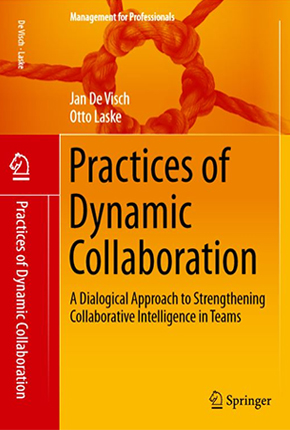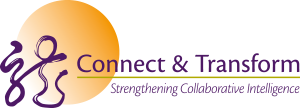Practices of Dynamic Collaboration
A Dialogical Approach to Strengthening Collaborative Intelligence in Teams

‘Practices of Dynamic Collaboration’
Opportunity: Combination package with ‘Dynamic Collaboration’ (Foundation book) + ‘Practices of Dynamic Collaboration’
Register for the “One year after inspiration seminar: Practice Cases of Dynamic Collaboration”
(1) What is this book about?
This book provides senior managers, team leaders, and coaches practical tools and insights to enhance team self-organization and collaborative intelligence. It builds upon the “Dynamic Collaboration” framework, focusing on the power of high-quality dialogue and understanding adult developmental maturity within teams. The authors introduce a research-based team formation, management, and evaluation paradigm, emphasizing “We-Spaces” (dialogue spaces) and critical facilitation techniques. It explores how to move organizations from hierarchical to shared leadership, synthesize human and algorithmic intelligence, and create humane workplaces where personal and professional development are intertwined.
(2) Who is it written for?
This book is tailored for senior managers, project and program managers, team coaches, team leaders, CEOs, board members, consultants, researchers, and academics in human resource management, adult development, team building, leadership, and organizational management. It’s particularly relevant for enhancing team dynamics and fostering collaborative intelligence in complex environments.
(3) Why did I write this book?
This book was written to provide a more practical and in-depth exploration of the “Dynamic Collaboration” approach, addressing the need for actionable tools and strategies. It aims to bridge the gap between theoretical understanding and real-world application, offering insights into fostering high-quality dialogue and leveraging adult development to enhance team effectiveness. The authors wanted to bring a more nuanced approach to team leadership and push back against “neo-tayloristic” approaches to human capital.
(4) What makes this book different?
This book distinguishes itself by:
- Focusing on the Dialogical Approach: It emphasizes the critical role of high-quality dialogue in building collaborative intelligence.
- Integrating Adult Development: It provides a research-based paradigm that incorporates team members’ social-emotional and cognitive development.
- Introducing “We-Spaces”: It utilizes the concept of “We-Spaces” to analyze and improve dialogue in different team contexts.
- Offering Critical Facilitation Techniques: It demonstrates using “dialectical” facilitation to strengthen employee ownership and improve meeting productivity.
- Practical Application: It provides real-world examples and case studies to illustrate the application of its concepts.
- Focus on role interpretation and perspective taking: The book also heavily focuses on improving understanding of role interpretation and helping teams utilize their members’ differing perspectives to become more effective.
(5) What has been the added value since its publication in 2022?
Since its publication, this book has:
- Provided practitioners with effective tools for enhancing team dialogue and collaborative intelligence.
- Offered a framework for understanding and leveraging adult developmental diversity in teams.
- Helped organizations move towards more humane and collaborative leadership models.
- Provided insight into how to create breakthroughs in cross-unit, transdisciplinary collaboration.
- Helped to increase the understanding of the importance of role interpretation.
- Helped to increase the understanding of how to utilize the different perspectives of team members.
(6) You don’t have time to read the book?
If you don’t have time to read the entire book, focus on the key concepts of “We-Spaces,” the importance of high-quality dialogue, and the role of adult developmental maturity. Pay attention to the chapters that discuss critical facilitation techniques. Also, pay close attention to the concepts presented in chapter 4, which details how to deal with upwardly and downwardly divided teams. Focus on the chapters that most directly relate to your team’s challenges. The introduction and first chapter provide a solid overview of the book’s core concepts.
The book serves as a companion guide for the third module of the Dynamic Collaboration Deep Immersion Program.
Since its publication, Jan De Visch has been invited several times to participate in debates in which the added value of different perspectives on team development is critically compared.
Contact Jan@connecttransform.be to discover how you can use this approach to transform laborious, critical team cooperation into aligned, mutually reinforcing collaboration.
How to order the book? Through Paypall (button on the left) or Amazon
Book price: 53 Euro + 6 % VAT + shipping costs.
Do not forget to explore our Foundation Book: Dynamic Collaboration

